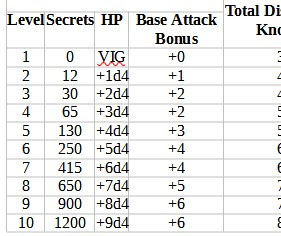Secrets (Again)
Earlier this month, I posted about my fumbling attempts to come up with an alternative to D&D-style abstract experience points for use in Secrets of sha-Arthan. I received a lot of helpful comments and they, along with private discussions and internal playtesting of the game's draft rules, have begun to bring me closer to a satisfactory solution. That said, there's still a lot of work to be done to get it just right, but then that's the sort of thing with which wider playtesting should help.
It is by now a truism, I think, to state that a roleplaying game's experience/advancement system, whatever form it takes, encourages certain activities and approaches to play by rewarding them. For example, Dungeons & Dragons awards experience points primarily on the basis of treasure, with a smaller but still more significant amount of XP given for defeating opponents. Consequently, D&D, at least in its classical form, is a game where treasure hunting and monster slaying take center stage, since those are the activities by which experience points are earned and characters can advance in levels. Advancement comes through different activities in other games, such as skill use in those derived from Basic Role-Playing.
If you're involved with any RPG long enough, you may notice that players sometimes begin to modify the way they play in accordance with what nets their characters the most in-game rewards. When I was a kid, I distinctly remember occasions when my friends would actively seek out "a few more experience points" by having their characters wander through the wilderness hoping that a random encounter would bring enough XP to achieve the next level. Players of BRP games are, of course, familiar with the phenomenon of "check mongering," in which players seek excuses to make skill checks for their characters, in the hopes of improving them.
I don't necessarily see anything wrong with this kind of emergent behavior. At base, RPGs are games and it's only natural – rational even – that players will try to find ways to use a game's rules to their advantage. Rather than attempting to find ways to disincentivize this behavior in Secrets of sha-Arthan, my instinct is to find ways to harness it to encourage the kind of adventures and campaigns that I enjoy, hence the shift to the accumulation of secrets rather than XP as the method of advancement.
 But what qualifies as a secret? There are two kinds of secrets. The first is mundane, namely, a fact about the setting that the character does not yet know. For example, encountering Unmaker cultists for the first time would certainly qualify as a secret in this first sense. For that matter, encountering almost any "monster" for the first time is also a secret. There are many other secrets in this sense – traveling to a far-off city, locating the entrance to a Vault, becoming aligned with a faction or cult, even coming into possession of a magic item.
But what qualifies as a secret? There are two kinds of secrets. The first is mundane, namely, a fact about the setting that the character does not yet know. For example, encountering Unmaker cultists for the first time would certainly qualify as a secret in this first sense. For that matter, encountering almost any "monster" for the first time is also a secret. There are many other secrets in this sense – traveling to a far-off city, locating the entrance to a Vault, becoming aligned with a faction or cult, even coming into possession of a magic item.However, there's a second type of secret, one that's closer to the usual sense in which the word is used. A secret of this type is something genuinely hidden or unknown, knowledge of which is rare within the setting. It's one thing simply to encounter the aforementioned Unmaker cultists, but it's another thing entirely to understand their origins and the nature of their beliefs. Likewise, many creatures, magic items, and spells tie into obscure aspects of sha-Arthan. These are the "true" secrets of the game.
I opted for this approach to character advancement because I hope it will encourage the kind of gameplay I most enjoy. Both my earlier Dwimmermount OD&D campaign and my ongoing House of Worms Empire of the Petal Throne campaigns are rooted in the uncovering of secrets of their respective settings. Refereeing House of Worms in particular has taught me that piecing together disparate pieces of knowledge about a setting can be very compelling to players. Indeed, it can become a powerful driver of both player and character engagement.
As the players could tell you, House of Worms is comparatively light on combat and treasure seeking; its main focus is and always has been on exploration of its setting and wrestling with the secrets thereof. The campaign's recent shift is toward an even greater focus on these matters and there is (as yet) no sign that this has in any way made the campaign less compelling – quite the opposite, in fact. It's my hope that I can "bottle" this approach in Secrets of sha-Arthan by not only being very explicit about its emphasis on exploration of its setting but also by rewarding such exploration in its advancement system. I can't pretend that it will be easy to do this well, but, armed with more than eight years of experience in this arena, I feel I have as good a chance as anyone to succeed.
Onward!
James Maliszewski's Blog
- James Maliszewski's profile
- 3 followers



